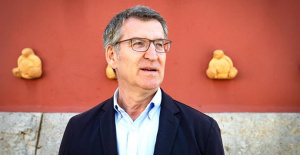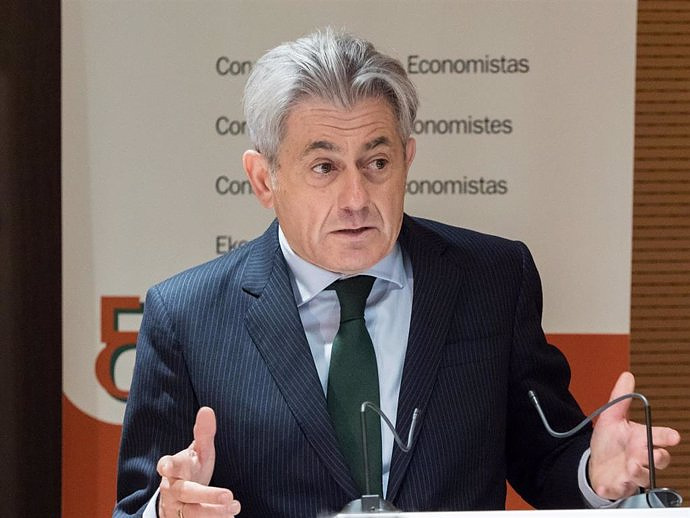He gives as an example what he experienced in the state of alarm to show his "concern" about the coordinating role of the State
MADRID, 5 Dic. (EUROPA PRESS) -
Laura Díez, the professor appointed by the Government to occupy a seat in the plenary session of the Constitutional Court, defends reforming article 149.1 of the Magna Carta, which delimits the exclusive powers of the State against the autonomous communities. In her opinion, "the role of the State is blurred, and proof of this has been the state of alarm."
This was pronounced within the framework of the Conference 'Aragon and territorial Spain: a roadmap for the immediate future', which was held after learning that it was one of the two chosen by the Government, together with the former minister Juan Carlos Campo to access to the High Court.
In his presentation, collected by Europa Press and entitled 'Intergovernmental relations: past, present and future', Díez argued that in order to improve collaborative relations between the Autonomous Communities and the State, different reforms and improvements must be addressed to " clarify the role of State coordination" assigned to it by article 149.1 of the Constitution.
For the professor of Constitutional Law, the limits of coordination of the State are not clear and in her presentation she pointed out that proof of this "has been to a certain extent the state of alarm and the role of coordination in matters of Health".
It should be remembered that in March 2020, when the Executive decreed the first state of alarm for the coronavirus pandemic, Díez had just arrived at the General Directorate of Constitutional Affairs and Legal Coordination of the Ministry of the Presidency, Relations with the Courts and Democratic Memory .
In his speech at these conferences, Díez did not want to go into detail about what happened during the state of alarm, but he pointed out that what happened -- the TC itself, to which he will now have access, declared it unconstitutional -- made him subscribe to that "concern" for the role of state coordination.
The professor defended that delimiting the scope of state coordination must suppose a link between this competence and those attributed to the autonomous communities and, she added, it can be carried out, for example, through the linking of sectoral conferences with conferences of presidents.
For Díez, another of the necessary reforms is that of the Senate, which should be "a territorial chamber", although he regretted that partisan interests prevent that chamber from being configured as such in Spain.
However, he pointed out that regulatory reforms are "necessary and urgent" to improve intergovernmental collaborative relations, and he maintained that the regulation included in the Constitution in this regard "is sparse and could be modified."
In this sense, Díez commented that this constitutional reform should be extended to the autonomous system as a whole because it would be of no use if "basic aspects such as the distribution of powers or financing" were ignored.
However, the professor was skeptical and said that in these terms a reform of the Magna Carta is not feasible from a political point of view. But she added that in the legal field, although the norm does not solve everything, there is a way to go.
"With the experience of 40 years of the autonomous State, mechanisms that have worked effectively should be strengthened. For example, bilateral commissions, (...) which continue to fulfill an essential function," he commented.
Lastly, Díez maintained in his speech that after studying the German political system for years, he advocates "stopping looking a bit" at the German country because it has been found that certain mechanisms "do not work at a certain time."

 Exploring Cardano: Inner Workings and Advantages of this Cryptocurrency
Exploring Cardano: Inner Workings and Advantages of this Cryptocurrency Seville.- Economy.- Innova.- STSA inaugurates its new painting and sealing hangar in San Pablo, for 18 million
Seville.- Economy.- Innova.- STSA inaugurates its new painting and sealing hangar in San Pablo, for 18 million Innova.- More than 300 volunteers join the Andalucía Compromiso Digital network in one month to facilitate access to ICT
Innova.- More than 300 volunteers join the Andalucía Compromiso Digital network in one month to facilitate access to ICT Innova.-AMP.- Ayesa acquires 51% of Sadiel, which will create new technological engineering products and expand markets
Innova.-AMP.- Ayesa acquires 51% of Sadiel, which will create new technological engineering products and expand markets Milei charges against the Spanish Government in response to some "slander and insults" by Minister Óscar Puente
Milei charges against the Spanish Government in response to some "slander and insults" by Minister Óscar Puente Feijóo, on the UN report: "We are not going to forget either the dictatorship or the terrorist group"
Feijóo, on the UN report: "We are not going to forget either the dictatorship or the terrorist group" A total of 19,887 migrants have arrived in Spain so far this year, 190% more, 15,982 of them in the Canary Islands
A total of 19,887 migrants have arrived in Spain so far this year, 190% more, 15,982 of them in the Canary Islands C-LM, Extremadura or Madrid, among the CC.AA that announce the creation of Bullfighting Awards after the suppression of Culture
C-LM, Extremadura or Madrid, among the CC.AA that announce the creation of Bullfighting Awards after the suppression of Culture How Blockchain in being used to shape the future
How Blockchain in being used to shape the future Not just BTC and ETH: Here Are Some More Interesting Coins Worth Focusing on
Not just BTC and ETH: Here Are Some More Interesting Coins Worth Focusing on Faraday UPV presents the 'Origin' rocket to exceed 10 km of flight: "It is the beginning of the journey to space"
Faraday UPV presents the 'Origin' rocket to exceed 10 km of flight: "It is the beginning of the journey to space" The Generalitat calls for aid worth 4 million to promote innovation projects in municipalities
The Generalitat calls for aid worth 4 million to promote innovation projects in municipalities UPV students design an app that helps improve the ventilation of homes in the face of high temperatures
UPV students design an app that helps improve the ventilation of homes in the face of high temperatures Ivace and promotes a less invasive device for the early detection of prostate cancer
Ivace and promotes a less invasive device for the early detection of prostate cancer A million people demonstrate in France against Macron's pension reform
A million people demonstrate in France against Macron's pension reform Russia launches several missiles against "critical infrastructure" in the city of Zaporizhia
Russia launches several missiles against "critical infrastructure" in the city of Zaporizhia A "procession" remembers the dead of the Calabria shipwreck as bodies continue to wash up on the shore
A "procession" remembers the dead of the Calabria shipwreck as bodies continue to wash up on the shore Prison sentences handed down for three prominent Hong Kong pro-democracy activists
Prison sentences handed down for three prominent Hong Kong pro-democracy activists ETH continues to leave trading platforms, Ethereum balance on exchanges lowest in 3 years
ETH continues to leave trading platforms, Ethereum balance on exchanges lowest in 3 years Investors invest $450 million in Consensys, Ethereum incubator now valued at $7 billion
Investors invest $450 million in Consensys, Ethereum incubator now valued at $7 billion Alchemy Integrates Ethereum L2 Product Starknet to Enhance Web3 Scalability at a Price 100x Lower Than L1 Fees
Alchemy Integrates Ethereum L2 Product Starknet to Enhance Web3 Scalability at a Price 100x Lower Than L1 Fees Mining Report: Bitcoin's Electricity Consumption Declines by 25% in Q1 2022
Mining Report: Bitcoin's Electricity Consumption Declines by 25% in Q1 2022 Oil-to-Bitcoin Mining Firm Crusoe Energy Systems Raised $505 Million
Oil-to-Bitcoin Mining Firm Crusoe Energy Systems Raised $505 Million Microbt reveals the latest Bitcoin mining rigs -- Machines produce up to 126 TH/s with custom 5nm chip design
Microbt reveals the latest Bitcoin mining rigs -- Machines produce up to 126 TH/s with custom 5nm chip design Bitcoin's Mining Difficulty Hits a Lifetime High, With More Than 90% of BTC Supply Issued
Bitcoin's Mining Difficulty Hits a Lifetime High, With More Than 90% of BTC Supply Issued The Biggest Movers are Near, EOS, and RUNE during Friday's Selloff
The Biggest Movers are Near, EOS, and RUNE during Friday's Selloff Global Markets Spooked by a Hawkish Fed and Covid, Stocks and Crypto Gain After Musk Buys Twitter
Global Markets Spooked by a Hawkish Fed and Covid, Stocks and Crypto Gain After Musk Buys Twitter Bitso to offset carbon emissions from the Trading Platform's ERC20, ETH, and BTC Transactions
Bitso to offset carbon emissions from the Trading Platform's ERC20, ETH, and BTC Transactions Draftkings Announces 2022 College Hoops NFT Selection for March Madness
Draftkings Announces 2022 College Hoops NFT Selection for March Madness



























